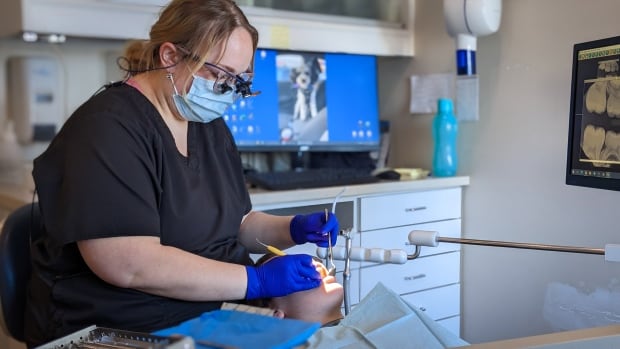Health
Complex Dental Procedure Rejections Surge Under New Canadian Plan

The expansion of dental care for uninsured Canadians has unveiled significant challenges, with over half of pre-authorized requests for complex procedures being rejected. According to Health Canada, from November 2024 to June 2025, 52 percent of these requests faced denial, raising concerns among dental providers about the impact of administrative inefficiencies on patient care.
While most dental claims do not require pre-authorization, more intricate and costly treatments—such as crowns and partial dentures—are subject to this requirement. Clinics must furnish additional documentation, including X-rays and dental charts, to demonstrate the medical necessity of procedures before they can be approved. Dr. Bruce Ward, a Vancouver dentist and president of the Canadian Dental Association, highlighted the frustration among practitioners: “There’s been a lot of confusion for dentists who send in what we would normally send in to a private plan, and it comes back rejected.”
The Canadian Dental Care Plan, a multibillion-dollar initiative, aims to assist residents with family incomes below $90,000 who lack private insurance. The program has recently expanded to include individuals aged 18 to 64, with 5.2 million people approved for coverage. Yet, only 2.2 million have accessed dental services thus far, suggesting a disconnect between eligibility and care delivery.
Challenges in Processing and Patient Access
Dental clinics are experiencing delays in the pre-authorization process, often waiting weeks or even months for responses from Sun Life, the insurance provider contracted by the government. Providers report that requests are frequently returned for lacking information, further complicating the approval process. Dr. Ward noted, “A lot of people have been waiting for crowns to be pre-authorized. There was an avalanche of approvals that got sent in.”
Health Canada attributes these delays to an unexpected volume of submissions, many of which were incomplete. Although there have been improvements, including streamlining the application process, clinics are still facing hurdles. The agency reported that 80 percent of pre-authorizations are processed within seven business days, and over 90 percent of basic claims do not require pre-authorization.
Despite the challenges, dental care providers express optimism about the program’s potential to increase access to care. Yet, some regions, particularly in Atlantic Canada, are struggling to accommodate the surge of new patients. This influx has led to backlogs, with some clinics already scheduling appointments into 2026.
Concerns Over Coverage and Financial Implications
Patients have been left with unexpected bills due to misunderstandings about coverage. The program reimburses clinics at rates lower than provincial fee guides, which has led to the practice of “balance billing,” where clinics charge patients the difference between what is covered and the actual cost of procedures. Dr. Ward recounted a recent situation where a patient was upset after believing their dental work would be fully covered.
Additionally, the program’s current allocation for preventive care, such as cleaning, has raised eyebrows. Adults receive only one hour of scaling per year, while teenagers are allotted just 15 minutes. Donna Wells, manager of professional practice at the Canadian Dental Hygienists Association, emphasized the need for better coverage in this area, noting that many patients have postponed care due to financial constraints.
Despite these obstacles, Dr. Ward remains positive about the overall impact of the dental care plan. He remarked, “It’s been a huge boon to a lot of people who frankly would never have been able to afford to have their mouths taken care of. It’s remarkable, and yes, there’s going to be some growing pains.” As the program continues to evolve, both providers and patients hope for smoother processes and enhanced access to essential dental care across Canada.
-

 Politics4 weeks ago
Politics4 weeks agoSecwepemc First Nation Seeks Aboriginal Title Over Kamloops Area
-

 World5 months ago
World5 months agoScientists Unearth Ancient Antarctic Ice to Unlock Climate Secrets
-

 Entertainment5 months ago
Entertainment5 months agoTrump and McCormick to Announce $70 Billion Energy Investments
-

 Science5 months ago
Science5 months agoFour Astronauts Return to Earth After International Space Station Mission
-

 Lifestyle5 months ago
Lifestyle5 months agoTransLink Launches Food Truck Program to Boost Revenue in Vancouver
-

 Technology3 months ago
Technology3 months agoApple Notes Enhances Functionality with Markdown Support in macOS 26
-

 Lifestyle3 months ago
Lifestyle3 months agoManitoba’s Burger Champion Shines Again Amid Dining Innovations
-

 Top Stories2 months ago
Top Stories2 months agoUrgent Update: Fatal Crash on Highway 99 Claims Life of Pitt Meadows Man
-

 Politics4 months ago
Politics4 months agoUkrainian Tennis Star Elina Svitolina Faces Death Threats Online
-

 Sports5 months ago
Sports5 months agoSearch Underway for Missing Hunter Amid Hokkaido Bear Emergency
-

 Politics5 months ago
Politics5 months agoCarney Engages First Nations Leaders at Development Law Summit
-

 Technology5 months ago
Technology5 months agoFrosthaven Launches Early Access on July 31, 2025





















